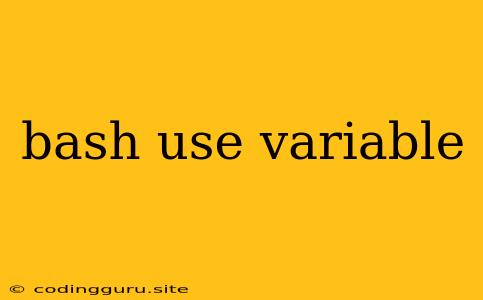Bash Use Variable: A Comprehensive Guide
Variables are the building blocks of any programming language, and Bash, the default Unix shell, is no exception. Understanding how to use variables effectively is crucial for writing powerful and efficient scripts. This guide will walk you through the fundamentals of using variables in Bash, covering their declaration, assignment, usage, and different types.
What are Variables?
In simple terms, a variable acts as a named container that stores data. This data can be anything – a string of text, a number, a file path, or even a list of items. The value of a variable can be modified as needed throughout your script.
Declaring and Assigning Variables:
In Bash, declaring a variable is as simple as assigning a value to it using the equal sign (=). There's no need to specify a data type; Bash will automatically infer it.
Example:
name="John Doe"
age=30
Here, we created two variables: name and age. name holds the string "John Doe", and age holds the integer 30.
Using Variables:
To access the value stored in a variable, use the dollar sign ($) followed by the variable name, enclosed in curly braces for clarity.
Example:
echo "Hello, $name! You are $age years old."
This will output:
Hello, John Doe! You are 30 years old.
Variable Naming Conventions:
While Bash doesn't enforce strict naming rules, following good practices will make your scripts more readable and maintainable:
- Use descriptive names:
filenameis better thanforfile. - Start with a letter or underscore:
_myVaris valid, but123varisn't. - Case sensitivity:
myVarandMyVarare different variables. - Avoid using reserved keywords: These are words that Bash uses for its own commands, like
if,while,for, etc.
Variable Types:
While Bash doesn't have explicit data types like other languages, it differentiates between different types of data based on how they're used:
- String Variables: Store text. Examples:
name="John Doe",message="Hello world!" - Numeric Variables: Can be used for arithmetic operations. Examples:
age=30,count=5
Special Variables:
Bash provides a set of built-in variables that offer useful information about the environment:
- $0: The name of the script being executed.
- $1, $2, ..., $n: Command line arguments passed to the script.
- $#: The number of command line arguments.
- $?: The exit status of the last executed command (0 indicates success).
Example:
#!/bin/bash
echo "Script Name: $0"
echo "Arguments: $*"
echo "Number of Arguments: $#"
# Example output:
# Script Name: myScript.sh
# Arguments: arg1 arg2
# Number of Arguments: 2
Working with Variables:
Here are some key practices for effectively working with variables in your Bash scripts:
- Quoting: Use single (
') or double (") quotes to prevent unwanted variable expansion or interpretation of special characters within string values.
Example:
message='This is a string with single quotes.'
message="This is a string with double quotes. It can contain $variables."
- Substitution: Replace the value of a variable with its contents.
Example:
name="John Doe"
echo "Hello, ${name}!"
- Arithmetic Operations: Use the
letcommand or arithmetic expansion with$(())to perform basic math.
Example:
let count=count+1
echo "Count: $((count))"
- Arrays: Store multiple values in a single variable.
Example:
fruits=("apple" "banana" "orange")
echo "The first fruit is: ${fruits[0]}"
Best Practices:
- Use clear and consistent naming conventions.
- Document your variables. Include comments explaining their purpose and expected values.
- Avoid unnecessary global variables. Opt for local variables within functions for better organization and reduced side effects.
- Be mindful of scope. Variables declared within a function are local to that function.
Conclusion:
Variables are indispensable tools in Bash scripting. By understanding their declaration, assignment, usage, and different types, you can write more powerful, flexible, and maintainable scripts. Remember to follow best practices and experiment with various techniques to make the most of Bash variables in your automation tasks and shell programming.
